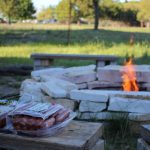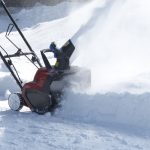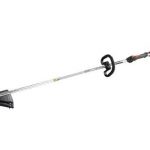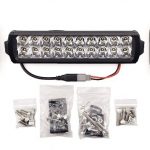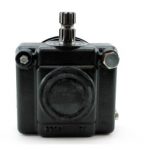It may sound odd, but every year, there are yard and forest fires started by lawn mowers. While we encourage you to wait for your lawn to dry out a bit before cutting it, sometimes the grass can get a bit too dry, and this can create the perfect situation for a fire to start while you are mowing. So how can you prevent a fire from starting while keeping your lawn trimmed up?
Don’t Let Your Grass Get Too High
Courtesy: thefixer via Flickr
The primary cause of fires due to lawn mowers is the grass being left to grow far too high. This creates particulates and clippings that will fly up over the deck and come into contact with the hot components such as the muffler. They can also get into the cooling fins and work their way into the warmest parts of the engine, causing ignition.
Not All Grasses Are Made the Same
Field grasses are completely different from common yard grasses. Field grasses tend to grow higher and faster, often growing higher than the mower deck itself. They also tend to be drier towards the top, while common lawn grasses tend to stop growing when they start to dry out in the extremities. If you allow your field grasses to grow too high, you’ll want to get someone with a dedicated field mower that can attack the high grasses for you and knock them down.
Unseen Fire Starters
With so many possible ways to start a fire, the ignition is often very old fashioned – the striking of the steel of a mower blade against a rock. Much like the idea of flint and steel that has been used to start fires since prehistoric times, this can cause a spark that will ignite dry grass. To avoid this, make sure to clear your path of rocks and other hard obstructions that can cause ignition through striking.
Change the Conditions
You can help to prevent fires by changing the mowing conditions. Consider watering your lawn to damp it down before mowing. Don’t water it to the point of causing a mess, but just enough that the blades of grass will not be particularly flammable. Try and choose the right time of day to mow if the conditions are dry – early in the morning, while there may be moisture left from overnight is the best time, and avoid windy days that can blow dry particles around.
Respect the Flammability of Fuel
Be careful with fuel, particularly when refueling after a day of mowing. If you accidentally spill gasoline on the grass, avoid mowing that patch until all of the fuel has evaporated, as the muffler or engine could ignite it. Even better, refuel over a hard surface or plastic container that can collect any spillover.
So make sure that your lawn and your mower don’t end up like the mower in the picture above. Keep your lawn clear of debris, don’t let your grass grow too high, and don’t mow parched grass. Always start your mowing close to the house and mow away from it – this creates a natural firebreak that can slow the spread of a fire should one ignite.

